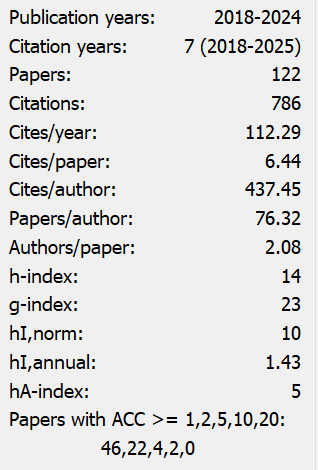The Impact of "Technology-Organization-Environment" Factors on the Digital Transformation of Retail Enterprises
Abstract
Based on the framework of "Technology-Organization-Environment", using the fuzzy set qualitative comparative analysis method, we take A-share listed retail enterprises as the research object, and explore the influence mechanism of the seven antecedents, namely, digital resource infrastructure, digital human resources, innovation capacity, absorption capacity, adaptive capacity, digital economy policy and marketization process, on the digital transformation of enterprises. digital transformation. The study finds that there are five types of groupings in high-level digital transformation, which can be categorized into four types: learning and transformation with technological-environmental synergy, coordinated pioneering with technological-organizational-environmental linkage, environment-led passive change, and technology-supported self-driven change. The study shows that digital resource infrastructure has a general driving effect on digital transformation of retail enterprises, and to a certain extent, it can substitute for innovative and adaptive capabilities; digital economy policy, as a key environmental element, is the main force driving the transformation. In addition, firms that fail to achieve a high level of digital transformation generally lack digital resource infrastructure, innovation capacity, digital economy policies and marketization processes.
References
[2] Bendig, D., Strese, S., Flatten, T. C., et al. (2018). On micro-foundations of dynamic capabilities: a multilevel perspective based on CEO personality and knowledge-based capital[J]. Long Range Planning, 51(6), 797-814. https://doi.org/10.1016/j.lrp.2017.08.002
[3] Chauoyk, T., & Tam, K. Y. (1997). Factors affecting the adoption of open systems: an exploratory study[J]. MIS Quarterly, 21(1), 1-24. https://doi.org/10.2307/249740
[4] Chen, L., Ma, H. J., & Zhou, Y. Q. (2024). Antecedent grouping, mode selection and promotion strategy of enterprise digital transformation[J]. Reform, (7), 65-79.
[5] Du, Y., Lou, J., & Hu, H. Y. (2023). Research on the cohort effect of enterprise digital transformation under supply chain common equity network[J]. China Industrial Economy, (4), 136-155.
[6] Du, Y. Z., & Jia, L. D. (2017). Group perspective and qualitative comparative analysis (QCA): A new path for management research[J]. Management World, (6), 155-167.
[7] Huang, M. Y., & Wang, X. X. (2022). Research on the Impact of Digital Transformation of Retail Enterprises on Operational Efficiency--An Analysis of Text Mining Based on Annual Reports of Listed Enterprises[J]. Journal of Beijing Technology and Business University (Social Science Edition), 37(1), 38-49.
[8] Jin, C. Y., Xu, A. T., & Qiu, K. Y. (2022). A study on measuring the level of digital economy development and its spatial correlation in Chinese provinces[J]. Statistics and Information Forum, 37(6), 11-21.
[9] Lai, X. B., & Yue, S. J. (2022). Did Smart City Pilot Promote Digital Transformation of Enterprises? --An empirical study based on a quasi-natural experiment[J]. Foreign Economy and Management, 44(10), 117-133.
[10] Li, M. Q., Li, D. F., Wei, L. X., et al. (2025). Research on supply chain strategy of manufacturing platform under socialized e-commerce: Considering price competition and BOPS cooperation[J]. Systems Engineering Theory and Practice, 1-20. Retrieved from http://kns.cnki.net/kcms/detail/11.2267.N.20241211.1522.014.html
[11] Liang, J., Yan, F., & Yang, Y. M. (2022). Does Digital Technology Drive High-Quality Development of Retail Industry? --A test based on a panel threshold model[J]. Economy and Management, 36(6), 15-24.
[12] Liu, X. D., He, M. Q., Liu, Y. S. (2023). Whether digital retailing can improve matching efficiency - An empirical study based on transaction demand heterogeneity[J]. Nankai Management Review, 26(6), 190-202.
[13] Liu, X. D., Mi, Z., He, M. Q., et al. (2022). Retail digital innovation and corporate competitiveness-an empirical study based on stakeholder perspective[J]. Business Economics and Management, (5), 5-17.
[14] Ruan, T. S., Qu, R., & Gu, Y. (2023). How can enterprises realize digital innovation under digital platform ecosystem[J]. Science and Technology Progress and Countermeasures, 40(23), 82-91.
[15] Sun, J. Y., & Li, F. Q. (2024). Pilot Free Trade Zone Enabling Digital Transformation of Enterprises: Theoretical Logic and Practical Path[J]. World Economic Research, (7), 13-28+134.
[16] Sun, W. Z., Mao, N., Lan, F., et al. (2023). Policy Empowerment, Digital Ecology and Enterprise Digital Transformation-A Quasi-Natural Experiment Based on the National Big Data Comprehensive Pilot Zone[J]. China Industrial Economy, (9), 117-135.
[17] Vial, G. (2019). Understanding digital transformation: a review and a research agenda[J]. Journal of Strategic Information Systems, 28(2), 118-144. https://doi.org/10.1016/j.jsis.2019.01.003
[18] Wang, H., Yan, Z. Y., Guo, G. Y., et al. (2023). Digital Infrastructure Policy and Enterprise Digital Transformation: "Enabling" or "Negative"? [J]. Quantitative and Technical Economic Research, 40(5), 5-23.
[19] Wang, Q., Wang, Z. X., & Liu, Y. Q. (2023). Research on the realization mechanism of digital transformation to enhance enterprise organizational resilience[J]. Journal of Management Science, 26(11), 58-80.
[20] Wang, X., Wang, Y., & Lv, J. (2023). Research on Information Consumption to Promote Digital Transformation of Enterprises[J]. International Financial Studies, (11), 87-96. https://doi.org/10.3390/ijfs11030087
[21] Wang, X. D., Wan, C. S., & Xie, L. J. (2023). Digital transformation strategy selection of retail enterprises - Based on the impact of transformation depth and breadth on total factor productivity[J]. Journal of Renmin University of China, 37(3), 56-69.
[22] Wang, Y., & Jiang, Z. Z. (2024). Exploring the digital transformation path of small and medium-sized private manufacturing enterprises based on the framework of "strategic triangle"[J]. Science and Technology Progress and Countermeasures, 41(21), 77-86.
[23] Xiao, T. S., Sun, R. Q., Yan, C., et al. (2022). Enterprise digital transformation, human capital restructuring and labor income share[J]. Management World, 38(12), 220-237.
[24] Xie, L. J., & Zhuang, Y. J. (2019). The new mechanism of retailing in the context of Internet and digitalization--Marxian circulation theory revelation and case study[J]. Finance and Trade Economics, 40(3), 84-100.
[25] Xu, N. (2024). Does the business environment promote the digital transformation of private enterprises[J]. Modern Economic Discussion, (7), 74-88+101.
[26] Xu, W. B., Tang, Q. Z., & Li, H. (2023). Intellectual Property Protection and Enterprise Digital Transformation - A Quasi-Natural Experiment Based on an Intellectual Property Model City[J]. Research Management, 44(10), 53-61.
[27] Xu, Z. Y., Gong, B., Chen, Y. M., et al. (2023). Fintech, digital transformation and corporate breakthrough innovations-an analysis based on the complex network of global patent citations[J]. Financial Research, (10), 47-65.
[28] Yang, L., He, X., & Gu, H. F. (2020). Executive team experience, dynamic capabilities and corporate strategy mutation: the moderating effect of managerial autonomy[J]. Management World, 36(6), 168-188+201+252.
[29] Yi, Z. G., Liu, Y. F., & Pan, Z. (2025). CEO traits and digital transformation of enterprises--variable selection based on machine learning[J]. Systems Engineering Theory and Practice, 1-26. Retrieved from http://kns.cnki.net/kcms/detail/11.2267.n.20241122.1419.002.html
[30] Zhang, J. W., & Tong, J. Y. (2023). Industrial Policy, Market Competition and Corporate Innovation Quality in the Digital Economy[J]. Journal of Beijing Institute of Technology (Social Sciences), 23(1), 125-136.
[31] Zhang, K. Q., & Jiang, Y. K. (2024). Managerial characteristics, dynamic capabilities and enterprise digital transformation: based on PLS-SEM model[J]. Systems Engineering Theory and Practice, 44(11), 3481-3500.
[32] Zhao, T., & Zhang, X. X. (2024). Digital Inclusive Finance and Corporate Tax Compliance--Based on the Perspective of Corporate Digital Transformation[J]. Taxation and Economy, (3), 18-31.
[33] Bendig, D., Strese, S., Flatten, T.C., et al. (2018). On micro-foundations of dynamic capabilities: a multilevel perspective based on CEO personality and knowledge- based capital[J]. Long Range Planning, 51(6), 797-814. https://doi.org/10.1016/j.lrp.2017.08.002


This work is licensed under a Creative Commons Attribution 4.0 International License.
Copyright for this article is retained by the author(s), with first publication rights granted to the journal.
This is an open-access article distributed under the terms and conditions of the Creative Commons Attribution license (http://creativecommons.org/licenses/by/4.0/).


























